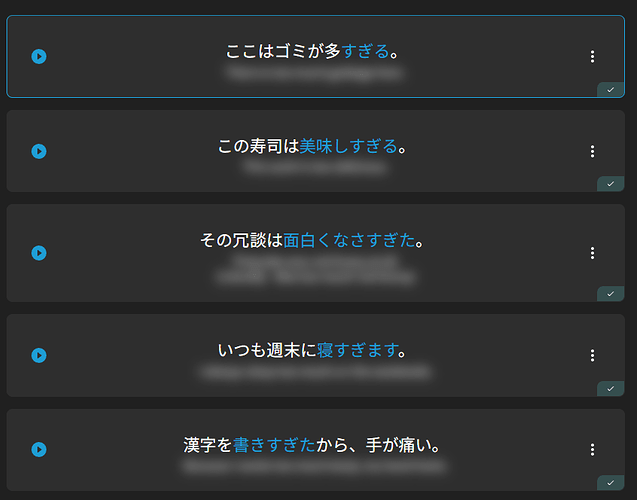I’m sorry if this is beating a dead horse, but I’m unclear on whether negative verbs get な or なさ before 過ぎる. The structure block implies either is acceptable but な is preferred, but the exercise is only correct with なさ. Can someone explain this?
Hi there, and thanks for posting on the forums! There are 2 versions of ない, one that functions as an auxiliary verb and attaches to verbs, and one that functions as an い-Adjective.
The one that follows verbs (the auxiliary verb) does not usually take さ, but a lot of people do use it in casual speech.
The one that follows adjectives (the い-Adjective) always takes さ.
Could you please let me know which exercise did not accept only な? The only verb I could see with this structure was 寝なさすぎる, and that one already has 寝なすぎる as an alternative answer.
Please can this grammar point be worded more clearly, and the SRS progression be made to progress more logically?
I’m currently stuck at Beginner 0 (because I’m finding it so hard), but the very first test question I keep getting is ‘お菓子を ________ でください。’ (Please don’t eat too much).
This feels like an advanced question and I really wish the SRS started with the basics (すぎる) before moving onto なさすぎる, the two focuses of the grammar point.
すぎない is barely even mentioned in the grammar explanation, and yet it’s the first question I get asked. It’s incredibly frustrating.
We’re in the process of adding new easier sentences to the majority of the grammar points currently, so hopefully that will help with this!
I’m currently stuck at Beginner 0 (because I’m finding it so hard), but the very first test question I keep getting is ‘お菓子を ________ でください。’ (Please don’t eat too much).
This question is second to last in the order so shouldn’t be showing up first. The first ones that should show up are the ones in the picture below:
Is it the case that you started studying this point a while ago and this particular review is a ghost? If possible, it would be helpful to have some details and I can let you know if you’re seeing the intended behaviour or not.
New easier examples sound great, thanks!
Unfortunately i can’t remember exactly how well i’ve done with this grammar point, but it’s one i only started recently and i don’t think i’ve ever made it past maybe Beginner 2? すぎる has really broken my brain 
あの人は私のタイプじゃなさすぎる。
(Literally ‘that person is too much not my type’)
a) would the affirmative version of this sentence be “あの人は私のタイプすぎる。”? Is that correct?
b) What would be the lighter version of the sentence in the sense of “that person is not too much my type” in opposition to “that person is not my type at all”?
あの人は私のタイプすぎない。Is that correct?
I’m confused regarding some of the example sentences:
- 私はお金がなさすぎる
- この店は商品がなすぎる
These are followed by the explanation “In the third example here, we can see that the さ has been omitted. This is not correct Japanese, as the さ will always be required when ない is functioning as an い-Adjective”
I don’t understand how the ない in these sentences is functioning as an adjective. Removing the use of すぎる would leave the first example sentence as 私はお金がない, which I believe would simply mean “I don’t have money”. Here the ない is the negative form of ある, so shouldn’t it be considered a verb and not an adjective? If I wanted to say “I have money” I would write 私はお金がある and if I wanted to say “I have too much money” I would say 私はお金がありすぎる.
When using the plain dictionary form of the verb "ある” (such as in お金がある), the adjective 無い(ない)is borrowed to be used instead of an actual negative verb form. This can be confusing when the English translation is simply “I have” vs “I don’t have”, but 無い is actually an adjective here.
To illustrate how 無い is actually an adjective, you can see how it can be morphed into a noun in the same way that adjectives can:
「お金の無さ」 = absence/ lacking of money
「経験の無さ」= lack of experience
「常識の無さ」= lack of common sense
I find that beginner resources often completely neglect to mention this for some reason 

